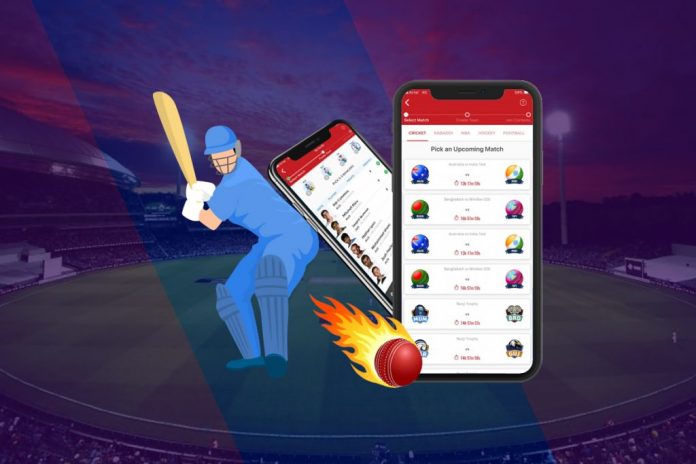This article is written by Darshit Vora of SVKM, Narsee Monjee Institute of Management Studies. The article analyses the growth and development of fantasy games and evaluates the debated issue of whether fantasy games involve skill or chance.
Table of Contents
Introduction
Fantasy sports are different from other sporting games because it is the combination of both real (using stats and actual players) as well as virtual (simulated league’s running on the internet.) According to the Cambridge dictionary, fantasy games are defined as games in which persons have to choose their players from both the teams can points are earned on the basis of the performance of the player.
In simple terms, the user has to pay entry fees and choose the players on the basis of his/her knowledge which will perform well, and if the selected player performs well the user will receive rewards. The prominent reasons for such tremendous growth of the fantasy Industry are due to the advent of technology, smooth internet connectivity, and an increase in the use of smartphones. In the past, many, countries didn’t realize the potential of the fantasy sports industry however, due to acceptance received to these apps from user’s many countries have started passing legislation to regularize and take efforts in developing this industry which can positively contribute to the growth of the country.
The country in recent times that has achieved the most growth in this industry in India. Indians have a special attachment towards sports. Due to the large availability of digital infrastructure and engineering talents in India. India has all the potential to become a global hub of fantasy games and influence the global sports industry and commerce.
Growth and development of Fantasy Gaming Apps
Fantasy games had their origins in the year 1960 where a Harvard Psychology professor named Bill Gamson invented a game which is now known as “The Baseball Seminar” in this game the college students were supposed to select a fantasy team of baseball players and the participants had to pay a nominal fee of ten dollars. Fantasy gaming started getting noticed post-globalization especially when the consumption of the internet increased across the world. Many western countries developed their sports platforms and users were allowed to select their teams after paying the minimum charge by the end of 1990 fantasy leagues on various sports were created like Baseball, Football, and Hockey.
In India the emergence of fantasy was felt post-2000’s the first fantasy game in India was ESPN super selector where the users had to select eleven players and form a cricket team. The game got instant popularity and within the span of two years had a user base of more than 5 lakhs. The major reason for such a boost was the 2003 world cup in which India played well and reached the Finals of the World Cup. Seeing such popularity with respect to fantasy games in India many media houses launched their own fantasy games. However, post the World Cup the user base of the fantasy apps reduced tremendously. The companies tried to make apps for different sports like Hockey and Football however it didn’t have as much acceptance as it did for cricket. Due to the reduction in the user base, many fantasy gaming companies had to be shut down.
In the year 2008, there was a launch of an inaugural season of the Indian Premier League. During that period Mr. Harsh Jain was looking to play fantasy cricket but couldn’t get any good app on the internet. Therefore, he and his friend named Bhavish Sheth and developed their own fantasy gaming platform which they named Dream 11. It is also the first Indian Fantasy gaming app. Indian Premier League had a major role in the development of Fantasy gaming apps in India. After seeing the success of Dream 11 in the field of Fantasy gaming a lot of Indian Companies started launching their own apps. Due to the increase in the availability of affordable smartphones and internet penetration the user base of fantasy games started growing rapidly.
Prior to 2020 USA had the largest fantasy gaming market with an annual revenue-generating around 2.91 billion US dollars. Until recently it was taken over by India. In India, from 2016-2019 there was a growth of 212% the major reason for such a growth of people getting internet access because of Jio. During that period fantasy gaming apps started getting acceptance from users in other sports like Kabaddi, Hockey, etc. The future of Fantasy gaming in India is bright and it is expected to generate an additional 5000+ direct and 7000+ indirect jobs in the next 2-3 years.
Existing laws and guidelines of Fantasy gaming apps in India.
In India, there are limited laws on fantasy gaming apps however, regulation on fantasy gaming can be interpreted in various gaming laws. Fantasy gaming is not recognized expressly as a subject in schedule VII of the Indian Constitution but till today it is interpreted under the list of gambling and betting. It is present in the state list giving authority to the state to legislate the matter.
Before coming into force of the constitution gaming was governed under the central legislation namely the Public gambling Act, 1987 in that act it was expressly mentioned that games that involve skill won’t be regulated under the gambling act. Further in the 276th Law commission, a similar thing was held that games based on mere skills can’t be considered as gambling. The Indian Courts on numerous instances declared fantasy gaming apps as games of skill. Further under Sikkim online gaming (regulations) act, 2008 allows games based on skill after acquiring a license from the relevant authority.
The Nagaland Prohibition of Gambling and Promotion and Regularization of Online Games of Skill Act, 2015 the only state legislation in India that recognized fantasy apps as games of skills. However, the legislation mandates the app developers to obtain a license to launch the app in the market.
Federation of Indian Fantasy sports had laid down the following conditions in its charter they are as follows:
- Minor user is restricted from playing fantasy gaming apps.
- In contests, skill is considered as the most important component which is exercised at the time of selection of the team.
- Post the deadline the users can’t change their selected squad.
- The user at the time of selection should exercise skills and have to act according to the rules that are mentioned in the terms and conditions.
- The users will only be allowed to select real-world players.
- The contest will be held on those matches that will take place in the future and not on historical sports matches.
- Members are restricted from offering gambling services.
The charter ensures that the game run by its members is purely skill-based and does not fall under the ambit of ‘gambling’.
An SLPC report suggested that a clear guideline on fantasy gaming apps is required which should be centrally administered and nationally applicable to boost the growth of fantasy gaming apps in India.
Niti Ayog, the think tank of the government of India agreed to this view of SLPC and in its discussion paper gave the following guiding principle for online fantasy platforms in India.
- The paper emphasized that the games should be based on skills for that the paper has recommended to forward the statistical data to the self-regulatory organization.
- Fantasy sports contests shall not be offered to users less than 18 years of age.
- The terms of participating in the contest should be transparent and fair and the users should be given pre-declared rules further complaint resolution mechanism should be provided to the users.
- Advertising and promotion of fantasy sports contests should be in compliance with the advertisement standards as prescribed by an appropriate body.
- If all the above guidelines are compiled then the state should offer criminal immunity to the app developers.
Though the development of laws and guidelines are limited as compared to other developed countries. However, the most essential thing is that fantasy gaming app is getting recognition and is being considered as the game of skill that protects the app developers from any criminal liability leading to the growth of this industry.
Fantasy gaming apps are games of chance or skills
This has been one of the most debated issues, it is a necessary difference between a game of skill and the game of chance. In Rex Vs Fortier the court held that game of chance refers to a game that is based entirely to a lot based on luck or uncertainty in which judgment, skill, or practice has no officer is known as the game of chance. Whereas a game of skills refers to where the outcomes are derived by the applicability of considerable knowledge or skills.
Arguments why fantasy gaming apps are a game of chance
According to Black’s Law dictionary gambling is the act of risking something of value (especially money) for a chance to win a prize. Complying with the definition fantasy gaming apps should be considered as games of chance it involves risking money for the chance of winning a prize. Fantasy gaming apps only involve user skill to select the team post that the users don’t have control over the performance of the athlete the same reason was given by the New York Supreme Court when it declared fantasy games as unconstitutional.
There is a difference is playing online and offline there is a scope of manipulation in online games which changes the nature form skill to chance. Further many fantasy apps allow their users to form multiple teams which provide greater security to the users which reduces the element of skill. Further, in fantasy gaming apps players which have more points are generally good players thus giving an indication to the users and reducing the element of risk.
Arguments why fantasy gaming apps are games of skill
Game of skills is those where even if there is a preponderance of skills and even if there is an element of chance if a game is preponderantly a game of skill, it would be a game of mere skills. Indian Courts have also relied on the dominant factor test. The test mentions that if the game is based on the user’s application of applying skills, they will be considered as not violating the gambling law whereas the outcomes which are totally dependent upon the element of chance would be considered as gambling. In Fantasy gaming, the selection of a team requires the user’s application of skill and satisfying the requirement of dominant test and can’t be considered as gambling.
A data report given by Prof. Zvi Gilula and the data showed that well-informed players are more likely to perform better as compared to non-skilled players. In the Supreme Court in Lakshmanan’s case, the court has held that skill of a person is a material factor whether the game is based on skill or chance. In fantasy gaming apps selecting a team is a material factor and should be considered as the game of skills.
The Punjab and Haryana High Court in Varun gambler vs Union Territory of Chandigarh and Ors court held that fantasy games are a game of skill because of the following reasons:
- Assesses players based on their availability and evaluate players on the basis of their worth and eliminating any kind of biasness for individual or team.
- The players are selected based on their past performance and statistics.
- The before selecting a team have to analyse the pitch, the form of the player, and the format of the game.
Further according to statistics, a person who knows players for, pitch conditions is more likely to win the competition than a person who has very little knowledge of the game.
The Indian Court has gone in favor of the view it is considered as a game of skill. Fantasy games pass both the tests laid by courts in different cases i.e., preponderance test and dominant factor test. The users select a team based on their technical expertise and prior knowledge of the game. A game can’t be considered as a game of chance just because it has an element of unpredictability.
Legal development of fantasy gaming in other countries
United States
In the United States, fantasy sports legislation is a state as well as a federal subject. Due to such demand for fantasy sports, the legislation was forced to enact laws that may regulate fantasy games. Interstate wire Act was an initial act that was passed to impose restrictions on sports betting but the act allowed legal gambling. Then came the Unlawful Internet Gambling Enforcement Act in 2006 the act exempted fantasy games from the scope of gambling or betting. In the year 2014 then-Governor, Mr. Andrew Coumo signed a bill named Interactive fantasy sports bill, the bill was enacted that it would allow fantasy games with the state of New York if the license is acquired by the developers.
Though a lot of states have adopted laws that support fantasy games and allow their use in that state but some states have shown a restrictive approach and haven’t still considered fantasy games as legal in their states.
Australia
Similar to India, Australia also has limited legislation to regulate fantasy games. In 2001 Interactive gaming Act came into effect. The act prohibited gaming but allowed games that are based on skill. Due to the growth of online fantasy sports post-2015, an amendment bill to the Interactive gaming act was passed just to regulate the fantasy industry. In the recent amendment in 2021, no fantasy gaming apps can operate without acquiring a license from the appropriate authority, and for any fantasy game to operate it should be a skill-based game.
United Kingdom
The United Kingdom as compared to other countries has a clear position. UK fantasy apps are regularized under the Gambling Act of 2005 jurisdiction. The act allows the functioning of fantasy sports operations provided they have acquired a license. The benefit of this law is that it allies in the whole of the United Kingdom thus reducing ambiguity for sports operators. The license is to be acquired from the Gaming Commission of license. The commission would only grant a license if all the rules are compiled by the operators.

Possible measures that can boost the growth of Fantasy games in India
No legislation in India concerning fantasy gaming app was passed because it was still not clear the game is based on skill or based on chance. However, the Supreme in Avinash Malhotra vs State of Madhya Pradesh court dismissed the public Interest litigation and held that fantasy games are games of skill and thus can’t be considered under the scope of gambling. Considering the recent growth of fantasy games in India the following steps must be taken to regulate and boost the growth of fantasy games in India.
- It is essentially a separate subject that should be created concerning online games and should be kept in the Union list. A subject in Union list only requires passage of central laws and it would be applicable throughout the country thus removing any kind of ambiguity or objections from the states. This, however, would require passage of the bill and should be passed with a 2/3 majority.
- Separate legislation should be enacted which would regularize the fantasy gaming Industry. The legislation should mention those who can’t play the game like unsound, minor, etc. Further, the legislation should mention about liability that the operators will have to pay if the rules of the legislation aren’t followed.
- In the Legislation, there should be an appointment of regulatory authority that would monitor the activities of fantasy gaming companies and can take strict action against those who contravene the proviso of the legislation.
- The Central government should take efforts to ensure that no ban is being imposed by states on the functioning of fantasy games. If a few states would ban fantasy games it would negatively impact the growth of the Industry.
- In the legislation, the companies shall be obligated to obtain a license from the regulatory authority. The license can only be given by the regulatory authority after the company has complied with the rules of the law. Statistical data should be furnished to the regulatory authority to ensure that the company is operating within the law.
- The regulatory authority should check that all licensed fantasy games have a grievance mechanism to protect the interest of the customers.
- The legislation should also mention advertisement standards concerning promotions of fantasy games. The standards should be made complying with the principle of decency and morality.
- The legislation and the government should ensure that the private data of the users aren’t getting leaked. If it is strict penalty and imprisonment punishment should be granted to those involved. If the data of the users are safe so more users would download the app and thus boosting the growth.
- The government should take measures to provide skills and knowledge to young people who are willing to enter this industry. The skill and knowledge would contribute to the company achieving greater success and therefore contributing positively to the economy.
- Foreign direct investments should be allowed in this industry to 100% through the automatic route where the company will have to face no regulations, which in turn, will boost the growth of this Industry.
These measures should be adopted to ensure that the fantasy gaming industry keeps on growing which will lead to a positive outcome towards the development of the economy.
Critical Analysis
Fantasy Industry over the years has witnessed tremendous ups and downs. Earlier fantasy games were considered as a form of gambling has started getting recognition and is been viewed as a game of skill. In recent years the country which has received maximum growth is India. India has though has laws on fantasy games but they are in bits and pieces to foster further growth of this industry in the country comprehensive uniform legislation must be passed.
Judiciary has played an effective role in recognizing the legality of fantasy gaming apps in our country. The Courts have expressly recognized fantasy games as those which are based on skills because it involves the application of knowledge from the part of users the players are picked by the users based on the pitch conditions, past performance, and format of the game. Thus, the argument that fantasy games are based on luck or chance can’t be held valid.
India is not the only country that lacks legislation concerning regulating fantasy gaming apps. Even the United States due to its federal nature has limited legislation to regulate fantasy gaming apps. However, counties should take inspiration from the UK which has a uniform law on the regulation of fantasy gaming apps.
Conclusion
Niti Ayog which is the think tank of the government to frame guidelines concerning the regularization of fantasy games is a step in the right direction. However, framing of guidelines would not make it binding to have strong uniform legislation the legislature will have to take efforts and will have to ensure that the legislation will be enacted by all the states of the country. Along with making efforts to boost the growth equally compliant efforts should be taken to ensure that consumer interest is not violated. Therefore, uniform legislation that discusses both parties should be passed. Government should also formulate policies to regulate advertisement policies so that companies in the name of awareness don’t breach the principle of decency and morality. Thus, it can be concluded that fantasy industry in India has a lot of potentials but that can only be achieved through government efforts.
References
[1] https://blog.ipleaders.in/fantasy-sports-india/. [2]https://www.livelaw.in/columns/business-of-fantasy-sports-legality-of-fantasy-gaming-172440. [3]https://www.indiatech.org/wp-content/uploads/2020/09/IndiaTech.org-Whitepaper-OnlineFantasySports-compressed.pdf. [4]https://assets.kpmg/content/dam/kpmg/in/pdf/2019/03/online-gaming-india-fantasy-sports.pdf. [5] https://ijlpp.com/evolution-in-the-jurisprudence-of-fantasy-sports-games/.LawSikho has created a telegram group for exchanging legal knowledge, referrals and various opportunities. You can click on this link and join:
https://t.me/joinchat/L9vr7LmS9pJjYTQ9
Follow us on Instagram and subscribe to our YouTube channel for more amazing legal content.
 Serato DJ Crack 2025Serato DJ PRO Crack
Serato DJ Crack 2025Serato DJ PRO Crack










 Allow notifications
Allow notifications


